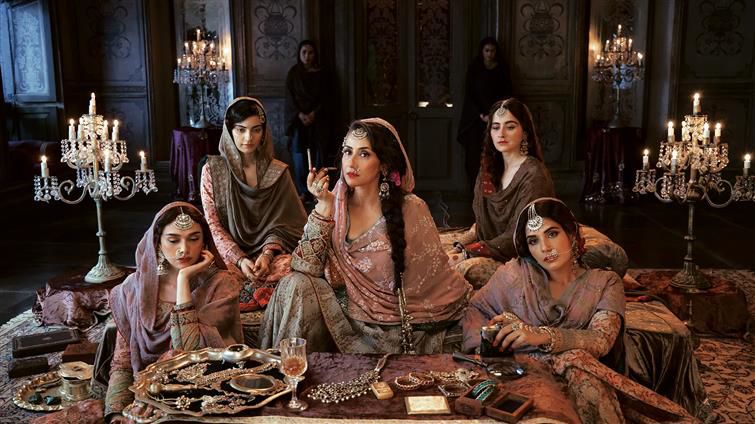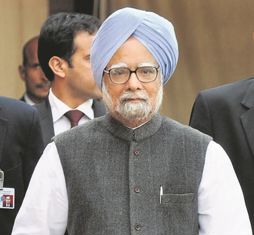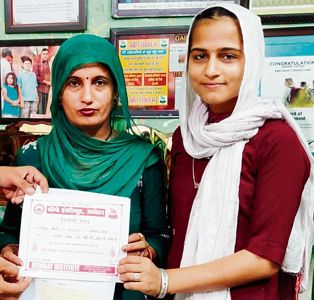At no point is ‘Heeramandi’ lacklustre. Its power to seduce ensnares and ensures submission to its well-crafted ways.
Film: Heeramandi: The Diamond Bazaar
Director: Sanjay Leela Bhansali
Cast: Manisha Koirala, Sonakshi Sinha, Aditi Rao Hydari, Richa Chadha, Sanjeeda Sheikh, Sharmin Segal, Taha Shah Badussha, Shekhar Suman, Fardeen Khan, Indresh Malik, Adhyayan Suman and Farida Jalal
Nonika Singh
The signature touch of Sanjay Leela Bhansali is all too visible in his digital debut. Opulence, thy name is ‘Heeramandi’ too. As we step back in time to Lahore of the 1940s and the master of spectacles makes our gaze rest on Mallikajaans and Bibojaans, the tawaifs who were much more than just nautch girls, we are taken in for sure. Not just by the splendour, the art design, the cinematography, music and mujras, but also his art of storytelling steeped in a concept by Moin Beg. The characters are far too many and it takes a while to figure out who’s who in this world of seduction, deception and nazakat.
The opening scene is set somewhere in the 1920s. The game of deceit and intrigue begins as the madam of the kotha sells her sister’s child for a princely sum. After all, sons are useless in this all-women domain. The lines between the two sisters are drawn, bloody and fierce. One loses, another wins and time which moves to 20 years after, will tell who really won.
Mallikajaan (Manisha Koirala) is the undisputed queen of kothas. And in the eight-episode series, she, who makes a dramatic entry with hennaed hands and feet, taking on a British officer with mirth and attitude, remains on top. Her two daughters have not taken after her in the guile department; one, Alamzeb (Sharmin Segal), aspires to be a poetess, while Bibojaan (Aditi Rao Hydari) has loftier ambitions — freedom of India.
Weaving the thread of freedom struggle while the prime focus is on the otherworldly tawaifs is a tough balance to achieve. And Bhansali, who has written the screenplay in his bid to valourise these women who captivated the nawabs and the British men of that era, does not make this particular angle as organic as it ought to have been. But, we are all ears and eyes when the tawaifs inhabit a world of deceit where sisters turn against each other, where their sahebs (benefactors with benefits) can be stolen by a more cunning competitor. They sing beautiful songs like ‘Sakal Ban’ (Amir Khusro’s words) and ‘Nazariya ki Maari’ (recreation of a ‘Pakeezah’ song), dance, rule, scheme, love and get hurt.
Tawaifs have no business to love or dream… we have heard that before and experienced their heartache in ‘Pakeezah’ and ‘Umrao Jaan’ with greater intensity. Richa Chadha as Lajjo joins the league and tribe of unrequited love. Even though she knows that ‘aurat ke sab se bade dushman uske khwab hote hain’, her female Devdas track is limited and here, too, it’s Mallikajaan who walks away with a dramatic flourish and her head held high. Her confrontation with her son, though striking, is left hanging.
Wily, sharp, ruthless and oh so beautiful Manisha Koirala proves she is timeless. As Mallikajaan, she not only outwits competition, but almost outshines all other actors. She is like a diamond, so hard it can bruise, but she is brittle too. The ever reliable Sonakshi Sinha, in a double role, which especially as Fareedan has spunk and chutzpah, comes close. Her rivalry with Mallikajaan has the requisite sting and keeps the zing going, but suddenly it all fizzles down rather tamely. After building the exciting showdown between the two, in the penultimate episodes, the series moves into the freedom movement track. Courtesans come together in a visually stunning protest march to the tune of azadi in solidarity with true blue patriot Bibojaan (the lovely, impressive and nuanced Aditi Rao Hydari).
Women power to the fore… indeed, men are no more than props in this all-women extravaganza, except for Indresh Malik in a standout performance as transman Ustadji. As for the much touted comeback of Fardeen Khan, he is not allowed much space or gravitas to make any impact. The best thing about the series is that though it’s all about amorous dalliances, sex as in good old Hindi cinema is only alluded to. Certain scenes, like the one where Mallikajaan is ready to suffer indignity at the hands of British officers, while evoking sufficient repugnance stir clear of lewd touches.
Nudity is a clear ‘no, no’. The romantic male lead Taha Shah as Tajdaar is introduced as flatteringly as possible, with Dadi (Farida Jalal) going gaga over her Oxford-educated grandson’s looks. She even suggests he must learn the ways of life from tawaifs. Only, he abhors them and it is but obvious he will fall for one of their ilk, who else but the budding poetess Alamzeb. Their old world romance has that vintage charm. But, the prem kahani does not make your hearts flutter and even the tragic twist will not bring tears to your eyes.
As a rule, Bhansali manages to appease all your senses… not just the visual. But here, the emotional core does not beat as strong. Nevertheless, fashioned after Bhansali’s inimitable aesthetic sensibility, ‘Heeramandi’ at no point is lacklustre. Its power to seduce ensnares and ensures submission to its well-crafted ways.














